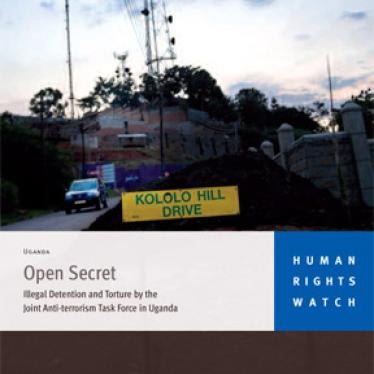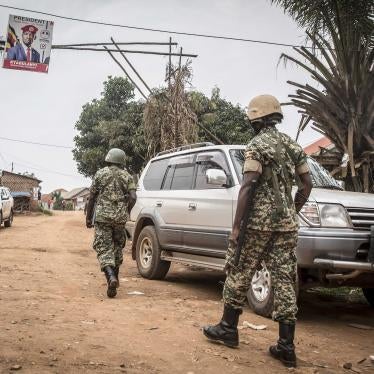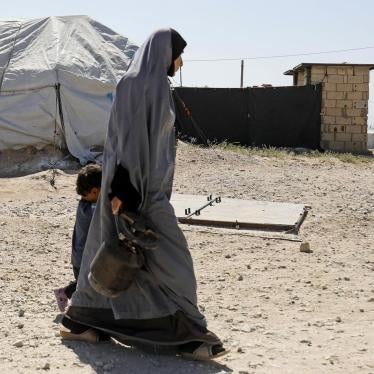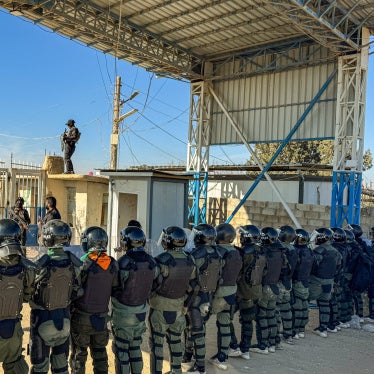(Kampala) - The Ugandan government should demonstrate its commitment to prosecuting security force abuses by appointing a court-ordered coroner to look into the death of a detainee, Human Rights Watch said today. No one has been held accountable for the death, in November 2007, of Saidi Lutaaya, who was held by the Joint Anti-terrorism Task Force (JATT) in Kololo, a suburb of Kampala.
On February 10, 2010, the High Court in Kampala ordered the minister of internal affairs to appoint a coroner within three months to carry out an inquest into Lutaaya's death. Lawyers for Lutaaya's family went to court in December 2009 to seek a court order for an investigation under Uganda's Inquest Act. Four months have passed since the High Court order, yet no one has been appointed to conduct the inquest, Human Rights Watch said.
"The Ugandan government should respect the High Court order and promptly conduct a formal inquiry into Saidi Lutaaya's death," said Rona Peligal, acting Africa director at Human Rights Watch. "This case is an important opportunity for the government to show a commitment to ending abuse by security forces."
Human Rights Watch in its 2009 report, "Open Secret," documented numerous cases of illegal detention, torture, and some extra-judicial killings by Uganda's Joint Anti-terrorism Task Force. It is not clear why JATT members arrested Lutaaya, who worked in the Old Taxi Park in Kampala as a hawker, on November 23, 2007, on the eve of the Commonwealth Heads of Government meeting. Witnesses told Human Rights Watch that once Lutaaya was in custody, Task Force members severely beat him and struck him in the head with a hammer. He fell unconscious, and was taken to Mulago hospital in Kampala, where he was pronounced dead. According to hospital staff, soldiers collected his body.
Lutaaya's family never received official information regarding the circumstances of his death, nor did they receive his body for burial. In 2009, Mulago hospital issued a death certificate that stated that Lutaaya had been brought to the hospital comatose but that the "cause of death was never ascertained."
Under the Inquest Act, the High Court can order the minister of internal affairs to appoint a coroner to investigate any death "when there is reasonable cause to suspect that the person died a violent or unnatural death... or while confined in any lock-up." The coroner has the power to order exhumation of the body, summon witnesses, gather other evidence to determine the manner of the death, and to forward any evidence to the High Court. Should the minister fail to comply with the High Court order, Ugandan legal experts said, the only legal recourse is for the complainant to file a motion to hold the minister in contempt of court.
The Joint Anti-terrorism Task Force is an ad hoc intelligence group headed by the Chieftaincy of Military Intelligence (CMI) and draws its operatives from the police, the armed forces, and Uganda's intelligence organizations. At the time of Lutaaya's death, and when many of the other abuses documented by Human Rights Watch occurred, the head of CMI was Col. Leopold Kyanda. Kyanda is currently the defense attaché at the Ugandan Embassy in Washington, DC.
In mid-2009, in a positive move, CMI's new leadership released some detainees who had been held for months without charge after the High Court ordered them to be brought to court. News media reported that military intelligence also transferred some JATT agents to other duties.
At the same time, several senior government and military officials promised to investigate past cases (including Lutaaya's) and to respond officially to Human Rights Watch's report. No state agency has yet done so, Human Rights Watch said. While Human Rights Watch has received fewer reports of human rights violations by JATT members in recent months, there have still been no prosecutions for the numerous abuses that occurred under JATT's auspices.
According to the United Nations Body of Principles for the Protection of All Persons under Any Form of Detention or Imprisonment, whenever a detained person dies in custody, "an inquiry into the cause of death or disappearance shall be held by a judicial or other authority." The findings of such an inquiry are to be made available upon request, unless doing so would jeopardize an ongoing criminal investigation.
"Ugandan officials should fulfill their promise and legal obligation to investigate deaths in custody, including Lutaaya's," Peligal said. "Holding perpetrators accountable is essential both for justice for the victims and to show that government will no longer tolerate abuses by the security forces."







